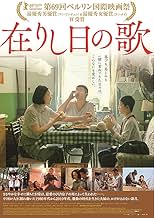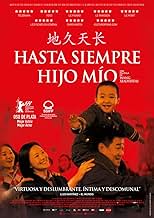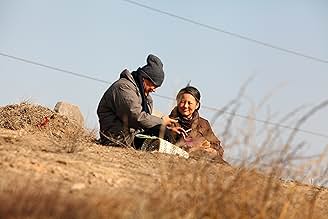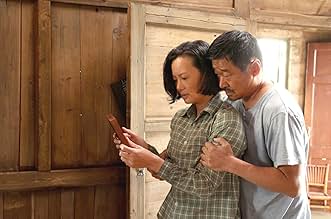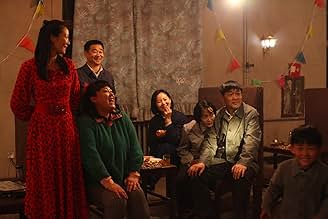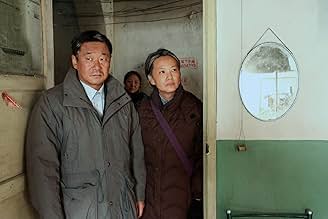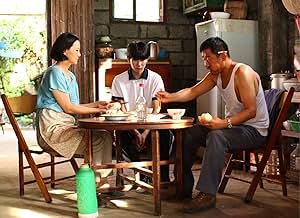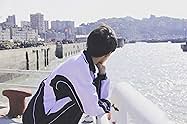Di jiu tian chang
- 2019
- 3 h 5 min
AVALIAÇÃO DA IMDb
7,7/10
5,9 mil
SUA AVALIAÇÃO
Dois casais estão se adaptando às grandes mudanças sociais e econômicas que estão ocorrendo na China dos anos 80 até o presente.Dois casais estão se adaptando às grandes mudanças sociais e econômicas que estão ocorrendo na China dos anos 80 até o presente.Dois casais estão se adaptando às grandes mudanças sociais e econômicas que estão ocorrendo na China dos anos 80 até o presente.
- Direção
- Roteiristas
- Artistas
- Prêmios
- 43 vitórias e 60 indicações no total
Yanguozhang Zhao
- Xinjian Zhang
- (as Yangouzhang Zhao)
- Direção
- Roteiristas
- Elenco e equipe completos
- Produção, bilheteria e muito mais no IMDbPro
Avaliações em destaque
I saw it as a honest - precise portrait of contemporary China. And as realistic, warm image of the essence of parenthood. A profound iuseful film for so many motives than it is unfair to define one of them because, I suppose, each viewer discovers something precious in this film about relations, children, names, fury and love at intense levels and, more important, about truth to yourself.
An immense emotional masterpiece with intellectual vibrations which invites the audience, through the crossed gaze of several Chinese families, to question the universality of the feeling of filiation and the meaning of existence. A magisterial and bitter melodrama. 7/8 of 10.
Chinese film 'So Long, my Son' opens with Yaoyun and Liyun, a couple in an industralised town during the 1980s, suffering a great personal tragedy. Some years later they have left their hometown and are living with their son in a port. Some years later still and they are returning for the first time to their hometown in order to see a dying friend. The gaps in-between are filled in by multiple flashbacks, during which we see the human costs of China's environmentally-sensible one-child policy; how the authorities attempt to crush personal expression; and the ramifications of Yaoyun and Liyun's tragedy.
All these flashbacks are difficult to keep track of, especially as they are not in chronological order. So from that aspect this is a film that would probably reward repeated viewing. Certainly I would be happy to see it again; as played by Jingchun Wang and Mei Yong, respectively, Yaoyun and Liyun are a likeable couple. Their circle of friends may be less well-developed, consisting of stock characters such as the fun-loving party girl, the free spirit and the blindly-loyal Party functionary, but they all add colour to the story. I also enjoyed the depiction of China's transformation and development over the two decades covered by the film.
I saw this in the cinema during the 2019 London Film Festival. While I certainly recommend it, I suggest waiting until you can watch it in your own home: at three hours long you will want to be as comfortable as you possibly can be!
All these flashbacks are difficult to keep track of, especially as they are not in chronological order. So from that aspect this is a film that would probably reward repeated viewing. Certainly I would be happy to see it again; as played by Jingchun Wang and Mei Yong, respectively, Yaoyun and Liyun are a likeable couple. Their circle of friends may be less well-developed, consisting of stock characters such as the fun-loving party girl, the free spirit and the blindly-loyal Party functionary, but they all add colour to the story. I also enjoyed the depiction of China's transformation and development over the two decades covered by the film.
I saw this in the cinema during the 2019 London Film Festival. While I certainly recommend it, I suggest waiting until you can watch it in your own home: at three hours long you will want to be as comfortable as you possibly can be!
From China, a masterpiece."So Long, My Son" is an epic account of two families dealing with the trials and tribulations of life in China from the 1980's to the present and is the kind of confident, heartfelt drama many Western filmmakers can only dream about. This is a family saga worthy of Ozu but perhaps even more grounded and down-to-earth, superbly acted by everyone, (leads Jingchun Wang and Mei Yong won Best Actor and Actress at Berlin and deservedly so), superbly shot on a large canvas by Hyun Seok Kim and brilliantly direced by Xiaoshuai Wang. It may not be the easiest film to follow; Wang doesn't tell his tale in a linear fashion as we move back and forth in time as memories are triggered but then who said cinema has to be easy to follow.
Of course, this isn't just a family drama but a comment on Chinese society and is consequently an intimate epic and a beautifully realised political saga at the same time. The 'One Family, One Child' policy is at its core and it is this need for family and for human contact in general that dictates the film's structure. Wang alternates between long shots and close-ups to emphasise the distance between the characters just as the use of colour and music, and naturally make-up, delineate the passage of time. The film begins with a death and death is never far from its surface and yet it's never sentimental but at times almost unbearably moviing. Like I say, a masterpiece and one of the finest films of recent years.
Of course, this isn't just a family drama but a comment on Chinese society and is consequently an intimate epic and a beautifully realised political saga at the same time. The 'One Family, One Child' policy is at its core and it is this need for family and for human contact in general that dictates the film's structure. Wang alternates between long shots and close-ups to emphasise the distance between the characters just as the use of colour and music, and naturally make-up, delineate the passage of time. The film begins with a death and death is never far from its surface and yet it's never sentimental but at times almost unbearably moviing. Like I say, a masterpiece and one of the finest films of recent years.
Saw this at the Berlinale 2019, where it was part of the official Competition. Two prizes were awarded: Silver Bear for Best Actor (Wang Jingchun) and one Silver Bear for Best Actress (Yong Mei). Apart from the acting, it was very interesting to see China transform in thirty years time, albeit that we see only a rural part of China, far away from the big city centers, thus avoiding large scale business and touristic areas.
Showing China while undergoing a drastic change, is one of the main themes of this movie, if not the main one. From a side line we get to see the transformation in progress, going from a communist country towards modern (semi?) capitalism. Factories, workplaces and houses the people work and live in, seem carefully designed to be true to the reality of the times at hand, thereby demonstrating an admirable attention for details.
A perfect example was the factory closure. The gathering with the workers was very illustrative. It showed that such things went in communist times exactly as how it goes nowadays. The workers assembled can protest and find that the director must be sent away. The harsh reality was (of course) in communist times exactly as in our capitalist times. Jobloss overcomes the humble workers, as if it was a natural disaster. There is nothing they can do about it, regardless of all being called "comrades". Neither can help be found in communist textbooks and the principles of "worker's self management".
On the other hand, regarding the implicit second theme, the family related stories of the protagonists, the developments were difficult to follow for me. This was partly due to some unnecessary time jumps and flash backs, partly caused by not telling who-is-who when a new protagonist appears, partly because of me being unable to tell Chinese people apart. Though the story starts with a fatal drowning accident, the people involved will re-unite in the end and will live happily ever after, even when the real truth comes out thirty years later, and even after someone admits having played a dark role in the accident.
It is no problem to sit out the three hours this movie lasts, though not really involving on a human level. And it was certainly not moving or heart-breaking as per what other reviewers wrote. The ground cause for this psychological distance is (see above) the difficulties I had to follow the persons involved, besides the fact that their logic was failing on me a few times.
All in all, I was glad to have seen this movie, regardless of my problems with following the various personal story lines and their interwoven connections. The nearly three hours are easy to sit through, so no problem there. And the ending was a surprise (no details, no spoilers), particularly because it did not cause a hard break in relationships, despite there would have been ample reason for a break-up after admitting a few 30-year-old lies.
Showing China while undergoing a drastic change, is one of the main themes of this movie, if not the main one. From a side line we get to see the transformation in progress, going from a communist country towards modern (semi?) capitalism. Factories, workplaces and houses the people work and live in, seem carefully designed to be true to the reality of the times at hand, thereby demonstrating an admirable attention for details.
A perfect example was the factory closure. The gathering with the workers was very illustrative. It showed that such things went in communist times exactly as how it goes nowadays. The workers assembled can protest and find that the director must be sent away. The harsh reality was (of course) in communist times exactly as in our capitalist times. Jobloss overcomes the humble workers, as if it was a natural disaster. There is nothing they can do about it, regardless of all being called "comrades". Neither can help be found in communist textbooks and the principles of "worker's self management".
On the other hand, regarding the implicit second theme, the family related stories of the protagonists, the developments were difficult to follow for me. This was partly due to some unnecessary time jumps and flash backs, partly caused by not telling who-is-who when a new protagonist appears, partly because of me being unable to tell Chinese people apart. Though the story starts with a fatal drowning accident, the people involved will re-unite in the end and will live happily ever after, even when the real truth comes out thirty years later, and even after someone admits having played a dark role in the accident.
It is no problem to sit out the three hours this movie lasts, though not really involving on a human level. And it was certainly not moving or heart-breaking as per what other reviewers wrote. The ground cause for this psychological distance is (see above) the difficulties I had to follow the persons involved, besides the fact that their logic was failing on me a few times.
All in all, I was glad to have seen this movie, regardless of my problems with following the various personal story lines and their interwoven connections. The nearly three hours are easy to sit through, so no problem there. And the ending was a surprise (no details, no spoilers), particularly because it did not cause a hard break in relationships, despite there would have been ample reason for a break-up after admitting a few 30-year-old lies.
Você sabia?
- CuriosidadesThe film explores the consequences across three decades of China's onetime one-child policy which lasted from 1979-2013.
- Erros de gravaçãoWhen Hao Shen's mother died, he wore a black cloth on his left arm. However, in most areas of China, especially in northern China, it is a folk custom for children to wear a black cloth on their right arm after the death of mother.
- ConexõesReferenced in Estrenos Críticos: Septiembre 2019 (2019)
- Trilhas sonorasAuld Lang Syne
Traditional tune, lyrics by Robert Burns
Principais escolhas
Faça login para avaliar e ver a lista de recomendações personalizadas
- How long is So Long, My Son?Fornecido pela Alexa
Detalhes
Bilheteria
- Faturamento bruto mundial
- US$ 8.096.596
- Tempo de duração3 horas 5 minutos
- Cor
- Proporção
- 1.78 : 1
Contribua para esta página
Sugerir uma alteração ou adicionar conteúdo ausente

![Assistir a Trailer [OVS]](https://m.media-amazon.com/images/M/MV5BZThlNmFjNjAtNjkwZS00NTU1LWJkM2ItZGIyNmVlZDRmMGM5XkEyXkFqcGdeQXRyYW5zY29kZS13b3JrZmxvdw@@._V1_QL75_UX500_CR0)
